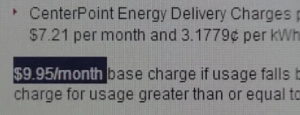 The telecommunications industry better not take a tip from some Texas power companies that have found new ways to increase profits: charging customers a penalty when they do not use enough electricity during the month. Imagine if broadband providers with Internet Overcharging schemes followed suit.
The telecommunications industry better not take a tip from some Texas power companies that have found new ways to increase profits: charging customers a penalty when they do not use enough electricity during the month. Imagine if broadband providers with Internet Overcharging schemes followed suit.
After Texas deregulated electric utilities, an increasing number of companies are using their freedom to find new, creative ways to tack on additional fees and surcharges that might normally be considered the cost of doing business.
CenterPoint Energy, a Fortune 500 corporation providing service in Arkansas, Louisiana, Minnesota, Mississippi, Oklahoma, and Texas would like to introduce you to its Minimum Usage Penalty — a $9.95 fee applied to Texans caught using too little electricity from the company.
While most utility companies set a basic customer charge applicable to everyone, which covers the cost of your electric meter, power lines and their upkeep, billing, and other administrative expenses, many Texas power companies are billing consumers a monthly fee for conserving too much electricity.
The concept flies in the face of common sense, especially as the state contends with dozens of 100+ degree summer days and pleas from utilities for customers to cut back on energy use. But if some do, especially low-consumption customers in apartments or those who maintain part-time residences, they’ll pay a penalty for doing so.
The Texas Electricity Ratings Blog found more than a dozen power companies with similar policies, with penalties as high as $12.96 for using less than 1,000 kWh per month:
Ambit Energy: $9.99 for less than 1000 kWh per month
Amigo Energy: Depending on the plan it is $9.95 of $6.95 for less than 1000 kWh per month
Bounce Energy: $4.95 for less than 1000 kWh per month for almost all of their plans, except intro plans are $6.96 per month for less than 1000 kWh.
Champion Energy: $4.95 for less than 500 kWh per month
Cirro Energy: $5.25 for less than 1000 kWh per month
Direct Energy: I couldn’t find a Monthly Fee in their Terms of Service or EFLs
Dynowatt: $6.95 for less than 1000 kWh per month
First Choice Power: $5 for less than 650 kWh per month, plus a $4.95 base charge
GEXA Energy: Seems to simply use a sliding rate per plan for different usage w/o a minimum charge
Green Mountain Energy: Didn’t seem to see any minimum usage charge in the EFL or Terms of Service
Mega Energy: $12.96 for less than 1000 kWh per month
MX Energy: Seems to simply use a sliding rate per plan for different usage w/o minimum charge
Reliant Energy: $9.95 for less than 800 kWh per month
Southwest Power & Light: I didn’t see minimum usage but they had a $7.95 monthly meter fee.
Spark Energy: $8.99 for less than 1000 kWh per month
StarTex Power: $4.99 for less than 500 kWh per month
Tara Energy: $6.95 for less than 500 kWh per month
Texas Power: $10.00 for less than 1000 kWh per month
TXU Energy: TXU uses a base $4.95 charge and sliding rates for less or greater than 1000 kWh, per plan.
[flv width=”600″ height=”358″]http://www.phillipdampier.com/video/KTRK Houston Higher Bills for Not Using Enough 7-11.flv[/flv]
KTRK in Houston provides surprising information about Texas utility usage-based-billing rates — power companies will charge you a penalty for not consuming enough electricity. Better hope broadband providers angling for UBB don’t catch on. (3 minutes)


 Subscribe
Subscribe
In all fairness, Minimum usage charges to a certain degree DO make sense for the electricity companies. Within reason. It costs money for electricity companies to have customers in the sense that they have to BUY electricity on estimated usage by customers each month to cover their customers. If a customer uses less than a certain amount, an REP is losing money on them. And that’s in addition to operating costs that are essential to running any business. The question is, are the fees reasonable? Some I would say yes, perfectly so. Otherwise I would say, no, they’re too high.… Read more »
As a comparison, here in New York where we also have rate deregulation, every ratepayer pays a basic customer charge which covers the infrastructure. Looking at a CenterPoint bill, they appear to charge this to customers already. What New Yorkers don’t have is a minimum usage fee from the REP (we call them ESCO’s here). Providers in New York have the benefit of decades of historical electric use estimation by the former regulated utilities that can uncannily predict usage based on past history, usage trends, and climate factors. Smart meters are not that common in western New York, so the… Read more »
Philip, Everything you described is pretty much how everything works in Texas. Which isn’t a shock, since New York and everywhere else have modeled their market after ours here in Texas. We’ve also gone through our growing pains with door to door sales, and unclear pricing. In fact, there’s even laws that keep door to door salesmen from crossing boundaries, and complaints can be made of unlawful switches in those situations called Slamming. The reality of the situation is that just because you’re not seeing a minimum usage charge spelled out in your Electricity Facts Label doesn’t mean that rates… Read more »